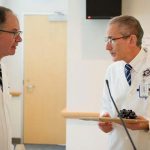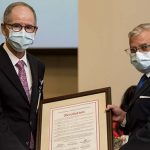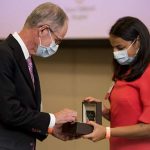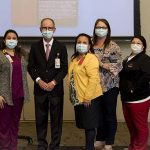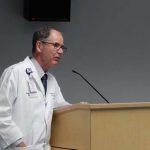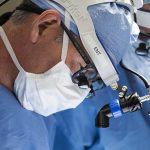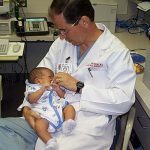One of Texas Children’s most prominent surgeons, researchers and mentors is retiring after 23 years of dedicated service to Texas Children’s patients, families, employees and staff.
Dr. David Wesson stepped down from his position as associate surgeon-in-chief at Texas Children’s Hospital and professor of Surgery and Pediatrics at Baylor College of Medicine on September 30 leaving behind a body of work that will live on in the efforts of many.
“David has trained dozens of clinical fellows and others throughout his career, many of whom have gone on to do great things,” said Chief of Global Surgery Dr. Jed Nuchtern at an in-person and virtual retirement party for Wesson. “He also has done ground-breaking research and has been a pioneer in the operating room. In short, he is a servant leader, a consummate academic and a well-established surgeon.”
View photos from Wesson’s retirement celebration and throughout his career at Texas Children’s below.
Wesson joined Texas Children’s in 1997 as chief of Pediatric Surgery, a position he held until 2012. Shortly after arriving, building a superior trauma program became a goal. He recruited pediatric surgical subspecialists with the ability to care for children with a broad spectrum of traumatic injuries and continues to serve as a mentor to trauma residents, fellows and faculty. He led the effort to attain Level I accreditation for the Texas Children’s Hospital Trauma Center, and he served as its director from 2010 to 2014. Wesson also was instrumental in building other programs such as the Texas Children’s Fetal Center, GI surgery and surgical oncology.
“Dr. Wesson fought hard to have a trauma program and firmly believed it was a service Texas Children’s should provide,” said Dr. Bindi Naik-Mathuria, medical director of the Trauma Center at Texas Children’s Hospital Medical Center Campus. “Over the past decade, the center has grown tremendously becoming one of the busiest in Houston and best in the region.”
Wesson said when he finished his training 40 years ago it was during a time of rapid change in trauma care. He said children with traumatic injuries were treated like other surgical patients with no special consideration for their needs. Programs that specialized in pediatric trauma care were just beginning to come into play. During his time with the Hospital for Sick Children in Toronto, Wesson set up a trauma service there and get involved in the American College of Surgeons, which helped establish criteria for what standards a center needed to be provide pediatric trauma care.
“Trauma is the leading cause of death for school age kids,” Wesson said. “It was then and is now. Children with such injuries should be treated by people who are specialized in pediatric trauma care and prevention.”
Wesson is well known internationally for participating in some of the earliest definitive studies on the non-operative treatment of solid organ injuries in children. His research helped to bring about a new approach to the treatment splenic of trauma without the need for surgery. Although it was strongly opposed at first it is now the standard of care not only for children but also for all age groups.
Wesson received the American College of Surgeons Committee on Trauma Millennium Commitment Award in 2000 and the Safe Kids Canada Founder Award in 2006. Baylor College of Medicine honored Dr. Wesson in 2013 with the Michael E. DeBakey Distinguished Service Award for his outstanding service.
He has published more than 110 peer-reviewed papers on pediatric trauma and gastrointestinal disorders in medical journals and 33 book chapters. In 2005, he edited a leading textbook, Pediatric Trauma: Pathophysiology, Diagnosis and Treatment. As a member of the American College of Surgeons Committee on Trauma, Wesson was a survey team member for Trauma Center designation for any years. He is a founding member of the International Society for Child and Adolescent Injury Prevention and serves on the Editorial Board of the Journal of Trauma.
Surgeon-in-Chief Dr. Larry Hollier said Wesson is known for his calm demeanor and that in a clinical setting, he fosters special relationships with patients and families, who trust his vast experience and composed wisdom. In surgical and academic settings, Hollier said Wesson’s peaceful nature forges collaboration and collegiality.
“David is a tremendous role model who has led with integrity and grace,” Hollier said. “We all are better having known him.”
Wesson said he has looked at his career as an opportunity to help people achieve what they set out to do. “I believe everyone wins in that type of situation, most importantly the patients.”
To honor Wesson’s legacy, The Board of Trustees passed a resolution honoring Wesson and his many accomplishments. To read the resolutions, click here.
In addition, West Tower Operating Room 7 will be named in his honor. The plaque outside the operating room says:
Generously Given in Honor of David E. Wesson, MD
In recognition of 23 years of service and leadership with Texas Children’s Hospital and the Department of Surgery.
Texas Children’s Trauma Service will be named after Wesson as well. The new name will be the David E. Wesson MD Trauma Service.



